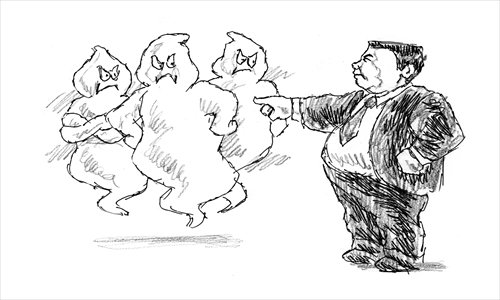Aggressive and showy tomb excavation campaign stinks to high heaven

In Chinese tradition, the removal of ancestral graves is the biggest insult one can endure, and those who excavate tombs are said to be subject to the most vicious curse.
Not only is great importance attached to ancestral graves, but many Chinese believe that only a proper tomb can bring peace to the deceased. This, to some extent, clarifies why a recent tomb destruction campaign has met with public rage.
In the past few months, a widespread push for large-scale tomb removal has swept across Central China's Henan Province, where many city governments have been fiercely criticized by the public.
Officials have explained that the purpose of the campaign is to promote funeral reform and regain land.
The city of Zhoukou has reportedly removed more than 2 million tombs since March and has seized about 2,000 hectares. The local government boasts its outstanding achievements as well as its "creative experiences" on its official website, despite overwhelming anger from the public.
Funeral reform ranks high up there alongside family planning as one of the most difficult things to enforce in rural areas. The rapid change in Zhoukou was only made possible by policies like providing free cremation and free public cemeteries as well as a series of punitive measures.
For example, Party members will be dismissed if they don't remove their ancestral tombs, while teachers will lose their jobs. However, it was also reported that some tombs were forcibly removed despite the resistance of the villagers.
Since the establishment of the PRC in 1949, the country has been engaged in promoting funeral reform by advocating cremation to replace burial and curbing construction of tombs to preserve farmland.
The need for such reform is obvious, given China's limited farmland and huge population. However, the only way this will work is if compromise is reached and the public will is fully respected.
Considering the cultural and historical background of tombs and the importance they have for people, villagers' resistance to their removal is not only understandable, but also predictable. In order for this plan to work, the government needs to both cooperate with and respect local residents.
More importantly, governments should be transparent about how the reclaimed land will be used.
Many people believe that local governments are more interested in real estate revenue rather than recovering arable land. The impulse of local governments in Henan to show off their tomb removal achievements has further fueled the public's mistrust.
Thanks to the latest amendments to the Regulations on Funeral and Interment Control on November 16, civil affairs departments are no longer allowed to use force to stop burials or the construction of tombs. This change highlights respect for the public will, and it is certainly a step in the right direction.
Those who excavate others' tombs are traditionally considered to be cursed. The reputation of some historical figures is forever tainted by their merciless excavation of others' tombs, such as Sun Dianying, a warlord in the 1920s who desecrated and looted the Eastern Royal Tombs of the Qing Dynasty (1644-1911). In light of strong public opposition, tomb removal in many cities has been halted, including in Zhoukou.
I am afraid the efforts of these local officials are doomed to go down in history as a bad example in the tale of China's funeral reform. China's local governments should understand that using force to promote reform is no longer effective today. Leaders in Henan and other provinces should take time to reflect on this.
The author is a reporter with the Global Times. yujincui@globaltimes.com.cn